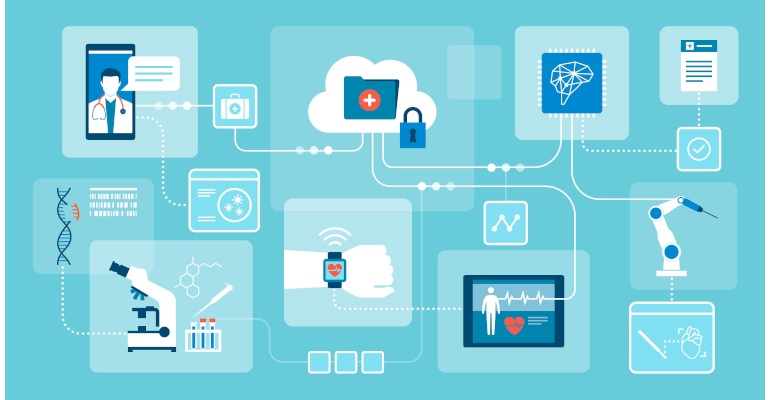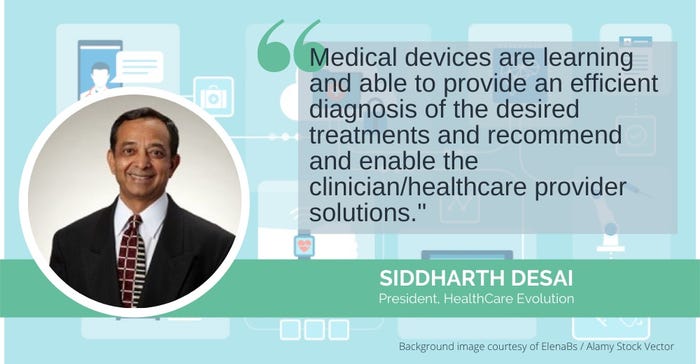Artificial intelligence & machine learning are changing the future of medical devices, says MD&M West 2022 speaker.
March 7, 2022

Adrienne Zepeda, Group Event Director, MD&M West
While still a relatively new tool in healthcare, artificial intelligence (AI) and machine learning (ML) technologies pose immense opportunities to drive industry-wide transformational advancement. Yet, we have a long way to go as medical devices become more complex and paradigms for developing AI algorithms are not transferable from the consumer to the clinical space.
Given the promise AI and ML offer in improving patient care and the challenges facing medical device engineers face as they adapt and refine these capabilities, the conference at Medical Design and Manufacturing (MD&M) West is heavily focused on ideating powerful solutions that will advance the maturation of healthcare’s advanced technologies. Slated to take place April 12-14 at the Anaheim Convention Center, MD&M West runs in tandem with four other engineering trade shows – WestPack, ATX West, D&M West, and Plastec West, providing attendees access to a five-in-one design and manufacturing event and the Design. Engineer. Build. conference that connects multiple verticals and industries.
With the event on the near horizon, I spoke with renowned medtech expert and prominent MD&M West speaker Siddharth Desai, president of HealthCare Evolution. We discussed industry trends and what attendees can look forward to learning in his technical and forward-looking session.
The adoption of AI and ML in healthcare is picking up speed. Could you speak to the current use of AI and ML in the medical device space and the opportunities these technologies afford?
Desai: AI and ML are invading the classical new product development domain in various ways and will change the future of medical devices. AI is an interdisciplinary approach to provide intelligence in diagnosis, treatment, and post-treatment assessment of the clinical challenges. This discipline is based on the development of firmware and algorithms; the medical devices are learning and able to provide an efficient diagnosis of the desired treatments and recommend and enable the clinician/healthcare provider solutions.
These treatments are viable because of the analytical capabilities, computing power, and firmware algorithms developed by the most brilliant engineers and scientists. So, these capabilities are incorporated in the medical devices as incremental features to the base devices and are added as modules or incorporated as separate devices. The applications for the AI systems are diverse and across the entire field of healthcare: "smart implants" that assess and enhance a total knee arthroplasty and the recovery from the treatment; "smart algorithms" that improve the ability to diagnose tumors, enhance the image of malignant tumors, and enable more effective treatments in endoscopy; "smart AI powered" infusion treatments that provide efficient dosage for a specific treatment to the clinician and the pharmacists; "smart" data analytics that renders the suggested optimum treatment to a clinician: and the patient who can use the AI reports to improve personal healthcare. AI/ML/DL is a vast opportunity and can be applied in the vast domain of healthcare.
What challenges do we still need to overcome to improve the application of these technologies?
Desai: Since the discipline is emerging, the challenges are unique to its applicability. First and foremost is the idea that a "smart machine" can replace a clinician. Working with key opinion leaders and everyday clinicians, we realize there is a certain level of skepticism. Clinicians go through multi-year training and hands-on work to get comfortable with the clinical practices. So, the adaption curve and overall success will be based on solid AI/ML/DL answers.
Secondly, the discipline must prove itself! While bold predictions can be made, the clinical space and human beings are unique, and the ability to predict the outcome at large will be a unique challenge. If the model developed by the engineers is inadequate or incorrect, the AI solutions may have serious consequences. So, in the seminar, we will discuss the critical success factors, planning for the solutions, and relevant case studies. We also define the basics of a business case to assess the opportunities.

I understand you are speaking at MD&M West in April. What can attendees look forward to learning about in your session?
Desai: Ours is a directly relevant session for those involved in the planning, development, and management of medical device innovation. We have a fantastic lineup of speakers who will discuss the best practices and share their experiences in medical device design and development.
The speakers will discuss and share their product design and development expertise from the entire product lifecycle, from concept to product launches. We will discuss critical aspects of development processes: capturing user inputs, detailed design and development processes and lessons learned, material selection processes, learning from world-renowned experts in TAVR development, and the essence of artificial intelligence. We will make this session an interactive, relevant, and exciting place. Our mission is to learn and share our experiences such that the attendees have a good learning experience as well as have some fun.
What excites you most about reuniting with your peers in person at MD&M West?
Desai: I have been involved in the medical device industry since 1983. Having worked for startups to large corporations, I have enjoyed being a catalyst for change. The industry has been equally kind to me; I have enjoyed success as a contributor to a leader. I feel obligated to learn and give back! Improving human lives excites me and enables me to think in the box and outside the box. It continues to challenge me to learn new things.
I am excited to share our session, my personal experiences, and meet and learn from fellow conference participants. The pandemic has had an impact on all of our lives. But, as life returns to normal due to the innovation of vaccines, the medical diagnosis industry with COVID-19 testing and facemask development is the direct contribution by our industry. We intend to share critical lessons learned, delve into innovation that is underway, and discuss the future as we can envision in 2022 and beyond.
To tune into Siddharth’s presentation “Artificial Intelligence Platforms and Next-Gen Applications & Use Cases,” register to attend MD&M West here.
You May Also Like


